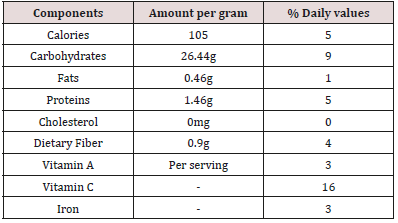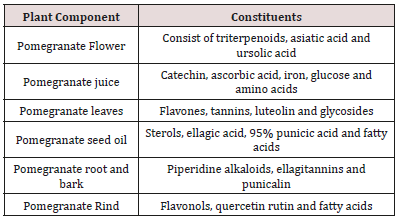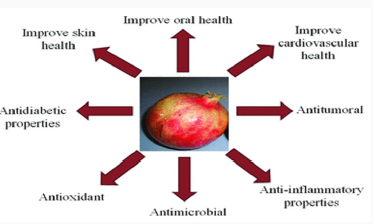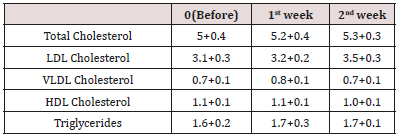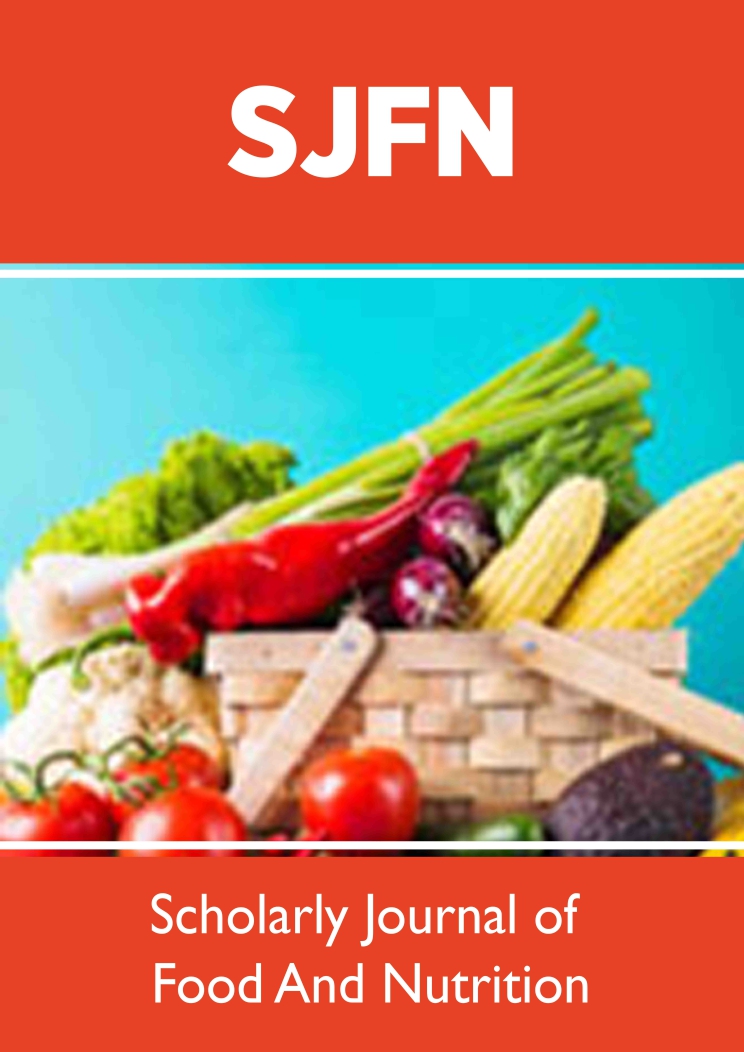
Lupine Publishers Group
Lupine Publishers
Menu
ISSN: 2638-6070
Review Article(ISSN: 2638-6070) 
Nutritional and Therapeutic Properties of Pomegranate
Volume 1 - Issue 4Qamar Abbas Syed*, Zara Batool, Rizwan Shukat and Tahir Zahoor
- National Institute of Food Science and Technology, Faculty of Food, Nutrition and Home Sciences, University of Agriculture, Pakistan
Received: August 30, 2018; Published: September 10, 2018
*Corresponding author: Qamar Abbas Syed, National Institute of Food Science and Technology, Faculty of Food, Nutrition and Home Sciences, University of Agriculture, Faisalabad, Pakistan
DOI: 10.32474/SJFN.2018.01.000118
Abstract
Pomegranate, grown in tropical climatic conditions has various therapeutic benefits due to bioactive compounds in it. This fruit is rich in antioxidants has been used from centuries for the treatment of inflammation, cancers, diabetes, hypertension, infertility and so many diseases. It is now being utilized in medicinal as well as nutrition industries due to its strong potential. Polyphenols present in pomegranate shows anti-proliferative properties as strong bases. Various in vitro and in vivo studies show that pomegranate is rich in organic acids, anthocyanins, sterols and catechin. India is among the top most countries producing and exporting this fruit. Some of its varieties are being used for commercial and ornamental means. However, some stress factors need to be evaluated in future to enhance its production and cultivation on national levels. In addition to this area that are producing pomegranate should be supplied by better climatic and fertility means to increase its demand.
Keywords: Pomegranate; Cultivation; Medicinal properties; Nutritional properties
Introduction
Pomegranate, the fruit of Punicacae family is a shrub or tree that grows approximately 16 to 26 feet tall. Punica granatum is its scientific name. It is also named as Seeded apple or Chinese apple. In northern areas this fruit grows during September to February while in southern parts it is available during March to May. Pomegranate has multiple long-lived branches its leaves are 2cm wide and 3-7cm long Newman [1]. Flowers have 3-7 petals and are red in color and seeds may vary from about 200 to 1400 in number. Seeds can be utilized in salads, appetizers, soups and desserts Still .
This fruit can grow as ornamental tree in parks and gardens. They are drought tolerant and can survive in dry areas. They are perfect winter foods, rich in fiber and rated among healthier fruits. Pomegranate is known for its quality of improving heart health, protecting against prostate cancer, help in preventing diabetes and are rich in antioxidants that help fight against cancers and free radical formation Seeram [2]. Juice and seeds of pomegranate contain vitamins, potassium and antioxidants three times more than green tea. Seeds are mostly used as spice in Pakistani food as Anar dana. These seeds are dried and used in curry formation. Supplements are available as dried form but by drinking concentrated juice which contains polyphenolic antioxidants one can survive from blood pressure and high cholesterol level in the body Heftmann.
Edible part of fruit consist 20% seed and 80% juice. In juice fructose and glucose are present in equal quantity. Polyphenol part consist of catechins, tannins, ellagic acid and anthocyanins. Its seeds are rich of pectin, sugars and fiber that benefits against heart diseases. Pomegranate reduces LDL cholesterol from the body and prevents against atherosclerosis Julie [3-6].
Cultivation
Pakistan produces pomegranate as major fruit. Balochistan is being the largest producer while KPK and Punjab are contributing to its production on isolated areas. 40thousand tons are producing on 9thousand hectares. This fruit grows on tropical and subtropical regions and its propagation can be done sexually as well as asexually. Pakistan has tremendous climatic conditions for the production of pomegranate but due to lack of knowledge of farmers, poor orchards management and lack of basic modern techniques limited its successful production AR Awan.
Varieties
Various varieties are present and are famous for their taste. Some famous are:
Bedana: Its seeds are soft and are of whitish or brown color. Pulp is of pink color and is sweet it is of medium to large sized fruit.
Kandhar: It contains hard seeds with blood red color pulp. This fruit is of large size and is sour in taste.
Alandi: Its seeds are very hard. It is medium size fruit with subacid pulp and it has fleshy pink color.
Dholki: This fruit is of commercial importance. It has hard seeds and whitish sweet pulp. It has dark patches of purple color at base. It is regarded as evergreen plant.
Kabul: This variety of pomegranate is large sized with dark yellow rind, and bitter taste pulp.
Muscat Red: Contain juicy pulp with hard seeds. This fruit is usually small in size and has thick covering.
Paper shell: It contains very sweet juicy pulp with fleshy covering and seeds are often soft. It is mostly of round shape.
Poona: This is often spotted and has grey to green color rind. This fruit has orange to red color combination and is large in size.
Spanish Ruby: It has combination of rosy aromatic pulp with seeds often soft and bright in color. It varies in size from medium to large size fruit.
Vellodu: It is of medium quality with sweet pulp and large size seeds Holland.
Global production
According to the current situation in the world USA, Iran, India, Pakistan and China are major producers of this fruit. Annual global production is said to be about 1.5 million tones. India has being ranked first in the production of 1.140 million tones on 0.125 million hectares. Iran exports the most amount 60,000 tones. Saudi Arab, UAE and Bangladesh import millions of tone of pomegranate from India. West Pakistan used to import this fruit to India in earlier centuries. Some countries like Mexico, France, Italy, Egypt and Greece are using this fruit as ornamental tree. Each part of pomegranate its leaves, roots, seeds and peel are of economical importance to the world [7-10].
Pollination
Pomegranate is pollinated by insects by cross and self means. Very little amount of pollen is dispersed by wind. 45 percent of fruit is settled down by self- pollination of flowers and cross means increase its production to about 68 percent. According to the season and variety of fruit size of pollen and fertility may vary [11-16].
How to eat it
a) To enjoy this fruit one need a knife, spoon and bowl
b) To lose its seeds roll around the pomegranate
c) Put the knife in center of the fruit and cut it into two parts
d) Take half part while facing towards bowl and tap its back with the spoon for seeds to come out
e) Repeat if for the other half and enjoy fruit with sweet juice and seeds (Table 1).
Serving sizes may differ
a) 1 pomegranate: 105 calories.
b) 1oz pomegranate: 19 calories.
c) 100gram contains: 68 calories (Table 2).
Therapeutic Importance of Pomegranate
a) Seeds of pomegranate contains low quantity of fats while high carbohydrate and protein content. According to an estimate ½ cup consist of 1 gram of fat, 16 grams carbohydrates and 1.5 grams proteins. 72 percent calories are provided by these components. It contains appreciable amount of vitamin C which is beneficial for blood clotting and immune system. Potassium the necessary mineral of the body is present in this fruit which is required for normal regulation of the blood pressure, muscle synthesis and nerve conduction system (Figure 1).
b) Antioxidants minimize the effect of cellular damage from oxidation process. These compounds are present in different vegetables fruits and cereals in great quantities. Department of Agriculture in USA regarded pomegranate as fifth largest fruit rich in antioxidant content. It has potential for the absorbance of radicals which are dangerous for human body.
Cholesterol level
Pomegranate is rich in major antioxidants like anthocyanins and tannins that may help to block the buildup of cholesterol in arteries which in return protect heart damage. Juice of this fruit may help to reduce the concentration of low density lipoproteins from the body which may protect the body from stroke attack (Behrenbeck, 2001). Leaf extract of pomegranate has potential to reduce serum cholesterol in mouse fed with high fat diet according to the weight of rats 400 to 800mg of extract was administrated for 5 weeks period. High fat diet with obesity symptoms rat were chosen. After this induction results were significant in reducing total cholesterol and triglycerides level of the body. Weight was reduced and intestinal absorption of fat was decreased. Energy and body HDL levels decreased showing beneficial effects of leaf extract of pomegranate (Lan et al., 2009)
Blood Pressure
Systolic blood pressure can be reduced by juice of pomegranate to a significant level. Potassium in it can prevent arteries from stiffness and atherosclerosis. It improves blood flow to the heart and reduces the incidents of heart attack. Clinical examination of improving blood pressure and endothelial functions of the body by consuming pomegranate juice have been performed. In order to measure the beneficial effects of juicy part of pomegranate 21 hypertensive patients were selected. Their age vary between 30 to 67 years. One group of 11 patients was given 150ml of juice to be taken either in lunch or dinner for 2 weeks. Similarly other group of 10 people was treated with the same amount of water. After the completion of the study results were positive in reducing systolic (p=0.002) and diastolic blood concentrations (0.038). It was also seen that serum level of vascular endothelial adhesion molecule was decreased up to (p=0.008) which has curative effects for patients regarding endothelial functions and blood pressure profile [17-22].
Memory and mood Enhancer
Flavonoids are believed to improve memory from declining and delay the onset of Alzheimer disease. These antioxidants have potential role for fighting against depression that can cause memory loss. Vinegar of pomegranate juice contains flavonoids of deep red color that helps prevent against radical formation. Pomegranate juice have natural compound Estrone that improves mood in menopausal women. It is generally believed that this compound can act as a replacement therapy for women suffering from mood disturbances.
Cancer Cells
Pomegranate juice can hinder the proliferation of cancerous cells in human body. It can block the flow of blood towards the tumors resulting in reducing its size and ultimately its destruction. Breast and prostate cancer cells have significant evidence of declining. Inhibition of cancerous cells causing prostate cancer in adults has been well recognized. USA has higher prevalence of prostate cancer. Pomegranate extract has shown positive correlation with the reduction of PC-3 carcinoma prostate cells it induces regular apoptosis of cancer cells. In addition to these benefits it also stops the proliferation of these dangerous cells to other parts of the body. In order to evaluate the effects of extract on cancer cells scientist performed different experiments. 22 participants were taken and 8 ounces of pomegranate extract was given for 13 months. After this time period results were drawn. Serum level of apoptosis of cancer cells reduced to a significant level in vitro study. It was seen that 40 percent oxidative stress in serum was reduced. Similarly there was a 90 percent blockage of invasion of cells across matrix [23-26].
Arthritis and Joint Pain
Inflammation of joints can result in pain and swelling in later age. Presence of Flavones in pomegranate extract has antiinflammatory effects that may reduce collagen induced arthritis and painful swelling of joints. Cyclooxygenases and lipoxygenase enzymes inhibits by extracts present in pomegranate seed oil. These key mediators of inflammation decreases by 75 percent by seed oil while pomegranate juice causes 23.8 percent reduction in these enzymes. In osteoarthritis these extracts diminishes matrix metallo-proteinases which is involved in degradation of extracellular joint matrix.It prevents collagen degradation and stops joint destruction.
Bacterial Infections
Pomegranate has millions of bioactive compounds fighting against infections like diarrhea and ulcers. Parasitic and bacterial infection reduces to the limit that may protect against respiratory disorders and cancers. Ellagic and gallic acids as natural antimicrobial agents has been used against Staphylococcus aureus and Escherichia coli for their ability to precipitate membrane proteins and inhibit enzymes that leads to lysis of cells. 80 percent of the inhibitory effects have been shown by this method [27].
Carotid Artery Disease
Study conducted in 2004 shows that daily consumption of 50ml of juice for 3years reduces the cholesterol damage of artery walls by almost half and lessens the incidence of stroke buildup. In a study 19 subjects with artery stenosis were given 50ml of pomegranate juice for two years. Participants were treated with similar hypocholesterolemic and antihypertensive medications. There was a 35% reduction in intima thickness of right and left arteries during these 2 years similarly 90% lipid peroxidases were reduced.
Breast Cancer
Extracts of pomegranate have anti estrogenic properties. It can delay the onset of breast cancer by blocking aromatase enzymes and cancer cell differentiation. Hormone levels in serum are well controlled by pomegranate extracts. Few studies have shown plausible effect of endocrinal breast cancer therapy in postmenopausal women where a non- significant response to estrogen receptor positive MCF-7 breast tumors were seen. Anticancer properties were tested at rate of 300ug/ml along with tamoxifen. Cancer cell proliferation inhibits to a great amount.
Anti-artherogenic effect
Seeds of pomegranate are rich in oil. This oil consists of Punicic acid approximately 95% which exerts its functions as an active component both in vivo and vitro studies. Process of apoptosis is induces by this oil and prevents from metastasis. Anti-atherogenic effect of Punicic acid present in seed oil of pomegranate was tested in laboratory for investigation. In the trial 51 subjects were treated with 800mg of seed oil two times a day for 4 weeks. Results have shown significant decrease in HDL level approximately 2.75mmol/L whereas glucose metabolism remains constant. Triglycerides concentration reduces to 5.7mmol/L and serum cholesterol has no effect. Punicic acid therefore has the ability to prevent arteries from dangerous accumulation of bad cholesterol and ultimately stroke.
Hypercholesterolaemia
A recent study shows that peel of pomegranate has prebiotic potential for lowering down the fat content of the body. It reduces the cholesterol of high fat diet over a period of 4 weeks and gut microbiota supports its action. Polyphenols present in pomegranate has the ability to prevent atherosclerosis and macrophage formation. This can be done by either direct combination of polyphenols with lipoproteins of the body or by indirect means through accumulation in arterial microphages. This in return blocks the synthesis of oxygen species and lipid peroxidation and lipid rich microphages. It also results in hydrolysis of lipids in atherosclerotic lesions. These polyphenols result in prevention of oxidation and heart attack in vitro as well as in vivo models.
Antiviral
Pomegranate has same effect in fighting viruses as do vitamin C and E has. Infections can be minimized by drinking juice regularly so that efficiency of immune system can be enhanced. Antiviral properties are attributed to RNA replication of influenza virus by pomegranate polyphenol extract. Punicalagin compounds at 40ug/ ml present in it has inhibitory effect on RNA replication of virus. Similarly phenolics of peel deactivate intracellular viral replication.
Skin Health
Pomegranates have vitamin C in it which is excellent antioxidant for skin health. It delays the process of aging and wrinkles. It has been said that if we mix powder of pomegranate peel with lemon juice and small amount of honey and apply it on face for sometimes it can remove dark circles around eyes and can treat pigmentation. Studies have shown ellagitannins at 500-10,000mg concentration inhibits free radical generation and protects it from DNA fragmentation, skin burns and depigmentation.
Tooth loss
Dental plaque and tooth loss can be prevented by seeds of this fruit. It possesses anti-microbial functions which can be helpful against oral bacteria. Health of gums can be improved by its seeds. It has been demonstrated by performing a study regarding the ability of peel or pulp of pomegranate richness in antioxidants. Ferric reducing antioxidant power assay ranked pomegranate as the richest fruit containing antioxidant potential among 28 fruits. Antioxidants were separated by the combined mixture of water, acetone and methanol. Different compounds like phenolic substances and anthocyanins were also evaluated by this study. Results shows that in preventing the formation of hydroxyl, superoxide anions and CuSO4 low density lipoproteins induction peel extract has greatest potential as compare to pulp extract. Flavonoids and phenolic compounds were also high in peel extract that were beneficial against oxidation and atherosclerosis and can be used as a natural supplement.
Weight Loss
Pomegranates are rich in fiber content that can bind extra fat and cholesterol from the body and facilitates its excretion and thus can prevent obesity in return. Leaves of this fruit induce fat and weight loss up to a significant level. In this study water, ethyl acetate and methanol were used to separate antioxidant fractions from seeds and peel of pomegranate. Diphenyl Hydrazyl and B-carotene linoleate models were utilized for this extraction. At 100ppm by using these two model’s methanol extract for seeds show 22.6 percent and 23.2 percent antioxidant potential. Similarly, for peel these models at 50ppm show 83 and 81 percent results for methanol solution. As peel extracts show highest antioxidant potential so it was used for testing its effects on low density lipoproteins level, peroxidation of lipids as well as on hydroxyl radicals in humans. For testing this method of thiobarbituric acid was used at 100ppm. This shows inhibition of these dangerous mechanisms up to 56, 58 and 93.7 percent respectively. So, this shows strong evidence of antioxidants potential in peel and seeds of pomegranate.
Immune System
Various health conditions related to throat and respiration can be resolved by pomegranates. As this fruit is rich in iron content it ensures normal platelet count of the body by which a person feels less fatigue symptoms. These fruits are often recommended for liver prevention. Pomegranate juice helps in the reduction of platelet aggregation and oxidative stress in mice and humans. In laboratory two human studies were carried out. In the first part 13 people having age between 20 to 35 years taking no medications and who were non-smokers were given daily 50ml of juice for 2 weeks while in the second part increased doses were given up to 80ml for 10 weeks to 3 subjects. Body mass index of all subjects remains same during the study. Blood samples of twelve hour fast were taken before study and after juice supplementation after 2 weeks. Results on lipoproteins and lipid levels were: Pomegranate juice inhibits aggregation and oxidation of atherosclerotic lesion and attenuate platelet activation (Table 3).
Myocardial perfusion
This study involves both the placebo and treatment groups at same time. Treatment group of 23 patients were given 240ml of juice while placebo group of 16 subjects was served with same caloric dose of sports drink. Patients in both groups were suffering from stress induced ischemia. After 3 months it was shown that angina attack and stress induced ischemia in treatment groups were reduced to 50 percent and (4.5±3.1 to 3.7±3.7) ratio while in placebo group it was increased up to 38 percent and (5.9±4.3 to 7.1±5.5). Therefore, myocardial perfusion in these patients was improved by consuming pomegranate juice.
Anti-diabetic Effect
By various studies it has been confirmed that by giving 200mg of peel extract according to weight per kg of the body polyphenols present in it affects glycemic index of the body by either inhibiting the uptake of glucose to peripheral tissues or by blocking its absorption by the gut. Similarly seed extract of this fruit when given to diabetes induced rats at an amount of 300 to 600mg for 12 hours reduces blood glucose level up to 47 and 52 percent.
Pregnancy Outcomes
As we have studied many times that pomegranate are rich in antioxidants so they protect placenta from oxygen reactive species. They also contain little amount of folate that helps fight against birth defects. It can help in the purification of blood and can enhance milk production. Acidity of urine reduces by the intake of pomegranate juice and improves health of urinary bladder by preventing harmful bacteria from entering into the urinary tract. This prevents inflammation and enhances immunity of the body.
Conclusion
Pomegranate is been studied from centuries and shows various outstanding therapeutic benefits both in vitro and in vivo trials. It has been regarded best as compare to green tea due to its antioxidant potential. All parts of this fruit have been utilized in food industry for prevention and treatment of various diseases. It shows no toxic effects to liver and other organs even if taken1420mg of tablet of pomegranate extract and can be used as natural supplement. However, it is the need of the time to promote its cultivation by traditional and non- traditional means in order to gain benefits of this fruit as well as to compete in global market for its export. In addition to this more studies and experiments are needed to evaluate effects of pomegranate in treating diarrheal diseases and in preventing fungal proliferation. Potential of this fruit in overcoming infections can bring tremendous progress in nutritional and therapeutic industries.
References
- Lansky EP, Newman RA (2007) Punica granatum (pomegranate) and its potential for prevention and treatment of inflammation and cancer. J Ethnopharmacol 109(2): 177-206.
- Adams LS, Seeram NP, Aggarwal BB (2006) Pomegranate juice, total pomegranate ellagitannins, and punicalagin suppress inflammatory cell signaling in colon cancer cells. J Agric Food Chem 54(3): 980-985.
- Guo C, Wei J, Yang J (2008) Pomegranate juice is 35 potentially better than apple juice in improving antioxidant function in elderly subjects. Nutr Res 28(2): 72-77.
- Basu A, Penugonda K (2009) Pomegranate juice. A heart-healthy fruit juice. Nutr Rev 67(1): 49-56.
- Romier-Crouzet B, Van De, WJ During A (2009) Inhibition of inflammatory mediators by polyphenolic plant extracts in human intestinal Caco-2 cells. Food Chemistry Toxicol 47(6): 1221-1230.
- Jung KH, Kim MJ, Ha E (2006) Suppressive effect of Punica granatum on the production of tumor necrosis factor (Tnf) in BV2 microglial cells. Biological Pharm Bull 29(6): 1258-1261.
- Sedigheh Asgary, Amirhossein Sahebkar, Mohammad Reza Afshani, Mahtab Keshvari, Mahmoud Rafieian Kopaei (2013).
- Zahra Razani, Mostafa Dastani, Hamid Reza Kazerani (2017) Cardioprotective Effects of Pomegranate Juice in Patients with Ischemic Heart Disease. Phytotherapy Researc 31(11): 1731-1738.
- Aviram M (1993) Beyond cholesterol modifications of lipoproteins and increased atherogenicity. In: Neri Serneri GG, Gensini GF, Abbate R, Prisco D (Eds), Atherosclerosis, inflammation and thrombosis.15-36.
- Witztum JL, Steinberg D (1991) Role of oxidized low density lipoprotein in atherogenesis. J Clinical Invest 88(6): 1785-1792.
- Aviram M (1993) Modified forms of low density lipoprotein and atherosclerosis. Atherosclerosis 98(1): 1-9.
- Suits AG, Chait A, Aviram M, Heinecke JW (1989) Phagocytosis of aggregated lipoprotein receptor dependent foam-cell formation. Proc Natl Academy Science USA 86(8): 2713-2717.
- Nina Volkova, Marielle Kaplan, Raymond Coleman, Tony Hayek, Dita Presser, et al. (2000) The American Journal of Clinical Nutrition 71: 1062-1076.
- Yunfeng Li, Changjiang Guo, Jijun Yang, Jingyu Wei, Jing Xu (2006) 96: 254-260.
- Du CT, Wang PL, Francis FJ (1975) Anthocyanins 8. of pomegranate, Punica granatum. J Food Science 40(2): 417-418.
- Artik N (1998) Determination of phenolic compounds in 12. pomegranate juice by using HPLC. Fruit Processing 8: 492-499.
- Waheed S, Siddique N, Rahman A (2004) INAA 13 for dietary assessment of essential and other trace elements in 14 fruits harvested and consumed in Pakistan. J Radioanalytical Nuclear Chemistry is 260(3): 523-531.
- Schubert SY, Lansky EP, Neeman I (1999) Antioxidant 14 and eicosanoid enzyme inhibition properties of pomegranate seed oil and fermented juice flavonoids. J Ethnopharmacol 66(1): 11-17.
- Nawwar MA, Hussein SA, Merfort I (1994) NMR spectral 16 analysis of polyphenols from Punica granatum. Phytochemistry 36: 793-798.
- Lansky EP (2006) Beware of pomegranates bearing 40% 24 Ellagic acid. J Med Food 9(1): 119-122.
- Lansky EP, Jiang W, Mo H (2005) Possible synergistic 27 prostate cancer suppression by anatomically discrete pomegranate fractions. Invest New Drugs 23(1): 11-20.
- Albrecht M, Jiang W, Kumi-Diaka J (2004) 37 Pomegranate extracts potently suppress proliferation, xenograft growth, and invasion of human prostate cancer cells. J Med Food 7(3): 274-283.
- Jeune MA, Kumi-Diaka J, Brown J (2005) Anticancer 55 activities of pomegranate extracts and genistein in human breast cancer cells. J Med Food 8(4): 469-475.
- Toi M, Bando H, Ramachandran C (2003) 41 Preliminary studies on the anti-angiogenic potential of pomegranate fractions in vitro and in vivo. Angiogenesis 6(2): 121-128.
- Chaudhari R, Shirsath NS (1976) Improvement of pomegranate by selection. South Indian Horticulture 24: 56-59.
- Al-Zoreky NS (2009) Antimicrobial activity of pomegranate (Punica granatum L.) fruit peels. Int J Food Microbiol 134(3): 244-248.
- Bialonska D, Kasimsetty SG, Schrader KK, Ferreira D (2009) The effect of pomegranate (Punica granatum L.) by-products and ellagitannins on the growth of human gut bacteria. J Agric Food Chem 57(18): 8344-834.

Top Editors
-

Mark E Smith
Bio chemistry
University of Texas Medical Branch, USA -

Lawrence A Presley
Department of Criminal Justice
Liberty University, USA -

Thomas W Miller
Department of Psychiatry
University of Kentucky, USA -

Gjumrakch Aliev
Department of Medicine
Gally International Biomedical Research & Consulting LLC, USA -

Christopher Bryant
Department of Urbanisation and Agricultural
Montreal university, USA -

Robert William Frare
Oral & Maxillofacial Pathology
New York University, USA -

Rudolph Modesto Navari
Gastroenterology and Hepatology
University of Alabama, UK -

Andrew Hague
Department of Medicine
Universities of Bradford, UK -

George Gregory Buttigieg
Maltese College of Obstetrics and Gynaecology, Europe -

Chen-Hsiung Yeh
Oncology
Circulogene Theranostics, England -
.png)
Emilio Bucio-Carrillo
Radiation Chemistry
National University of Mexico, USA -
.jpg)
Casey J Grenier
Analytical Chemistry
Wentworth Institute of Technology, USA -
Hany Atalah
Minimally Invasive Surgery
Mercer University school of Medicine, USA -

Abu-Hussein Muhamad
Pediatric Dentistry
University of Athens , Greece

The annual scholar awards from Lupine Publishers honor a selected number Read More...




